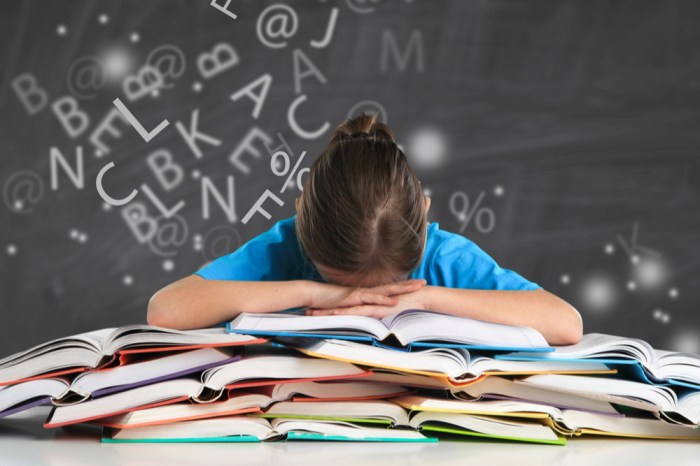A student with dyslexia may also be intellectually gifted. – A student with dyslexia may also be intellectually gifted, presenting a unique and complex profile. This overlap challenges traditional notions of learning and intelligence, highlighting the importance of comprehensive assessment and individualized support.
Dyslexia, a neurodevelopmental disorder, affects an individual’s ability to read, write, and spell. Intellectual giftedness, on the other hand, refers to exceptional cognitive abilities and potential. While these conditions may seem contradictory, research suggests that they can coexist within the same individual.
Definitions and Characteristics: A Student With Dyslexia May Also Be Intellectually Gifted.

Dyslexia is a neurodevelopmental disorder that affects reading, writing, and spelling. It is characterized by difficulty in phonemic awareness, phonological processing, and rapid naming. Students with dyslexia may also have difficulty with comprehension, fluency, and vocabulary.
Intellectual giftedness, on the other hand, is characterized by exceptional cognitive abilities. Students who are intellectually gifted typically have high IQ scores, strong reasoning skills, and advanced academic achievement. They may also be creative, curious, and have a wide range of interests.
It is possible for a student to have both dyslexia and intellectual giftedness. This is known as twice-exceptionality. Students who are twice-exceptional may have unique strengths and challenges that require specialized educational support.
Cognitive Profile
Students with dyslexia may have a range of cognitive strengths and challenges. Some of the cognitive strengths that have been identified in students with dyslexia include:
- Strong visual-spatial skills
- Excellent problem-solving abilities
- Creative thinking
- Good memory for non-verbal information
Some of the cognitive challenges that have been identified in students with dyslexia include:
- Difficulty with phonemic awareness
- Difficulty with phonological processing
- Difficulty with rapid naming
- Difficulty with comprehension
- Difficulty with fluency
- Difficulty with vocabulary
Intellectual giftedness can impact cognitive functioning in students with dyslexia in a number of ways. For example, students who are intellectually gifted may be able to compensate for some of the cognitive challenges associated with dyslexia. They may also be able to use their strengths to develop strategies for overcoming these challenges.
Educational Implications, A student with dyslexia may also be intellectually gifted.
Students with both dyslexia and intellectual giftedness have unique educational needs. These students may need specialized instruction in reading, writing, and spelling. They may also need support with social-emotional development. It is important for teachers to be aware of the unique needs of these students and to provide them with the support they need to succeed.
Some of the strategies that can be used to meet the academic and social-emotional needs of students with dyslexia and intellectual giftedness include:
- Providing explicit instruction in reading, writing, and spelling
- Using multisensory approaches to learning
- Providing opportunities for students to use their strengths
- Creating a supportive and encouraging learning environment
Differentiated instruction and accommodations can also be helpful for students with dyslexia and intellectual giftedness. Differentiated instruction involves tailoring instruction to the individual needs of students. Accommodations are changes to the learning environment or to the way instruction is delivered that can help students with disabilities access the general education curriculum.
Identification and Assessment
Identifying students with both dyslexia and intellectual giftedness can be challenging. This is because the symptoms of dyslexia can mask the signs of intellectual giftedness. It is important to conduct a comprehensive assessment that includes both standardized testing and qualitative measures.
Standardized testing can help to identify students who have difficulty with reading, writing, and spelling. Qualitative measures can help to identify students who have strengths in other areas, such as creativity, problem-solving, and reasoning.
Early intervention is essential for students with both dyslexia and intellectual giftedness. This can help to prevent these students from falling behind in school and to develop the skills they need to succeed.
Support and Advocacy
It is important to provide support and advocacy for students with dyslexia and intellectual giftedness. Parents, teachers, and school administrators all have a role to play in supporting these students. Parents can provide emotional support and encouragement. Teachers can provide specialized instruction and accommodations.
School administrators can create a supportive and inclusive learning environment.
Collaboration and communication are essential for providing support to students with dyslexia and intellectual giftedness. Parents, teachers, and school administrators need to work together to develop a plan that meets the individual needs of each student. They also need to communicate regularly to ensure that the student is making progress and that their needs are being met.
FAQ Summary
What are the cognitive strengths of students with dyslexia?
Students with dyslexia often exhibit strengths in creative thinking, problem-solving, and visual-spatial reasoning.
How can intellectual giftedness impact cognitive functioning in students with dyslexia?
Intellectual giftedness can enhance cognitive strengths in students with dyslexia, leading to exceptional abilities in areas such as mathematics, science, and the arts.
What are the unique educational needs of students with both dyslexia and intellectual giftedness?
These students require differentiated instruction that addresses their specific learning needs, including accommodations for dyslexia and enrichment opportunities for their giftedness.


